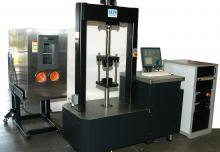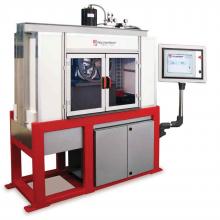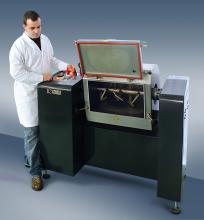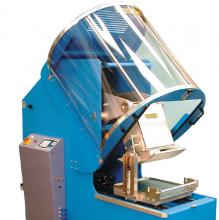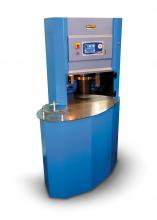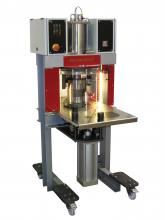The stresses placed on modern asphalt and bitumen means that specialist equipment is essential to make sure performance specifications are met. As road traffic increases at a rapid pace and road safety becomes a priority issue, asphalt is put under increasingly higher stresses. For example, road surfaces are subject to compression, flexural tensions and tangential stresses: internal friction, depending on the aggregates, and the cohesion, guaranteed by bitumen's composition, are the two main properties whic
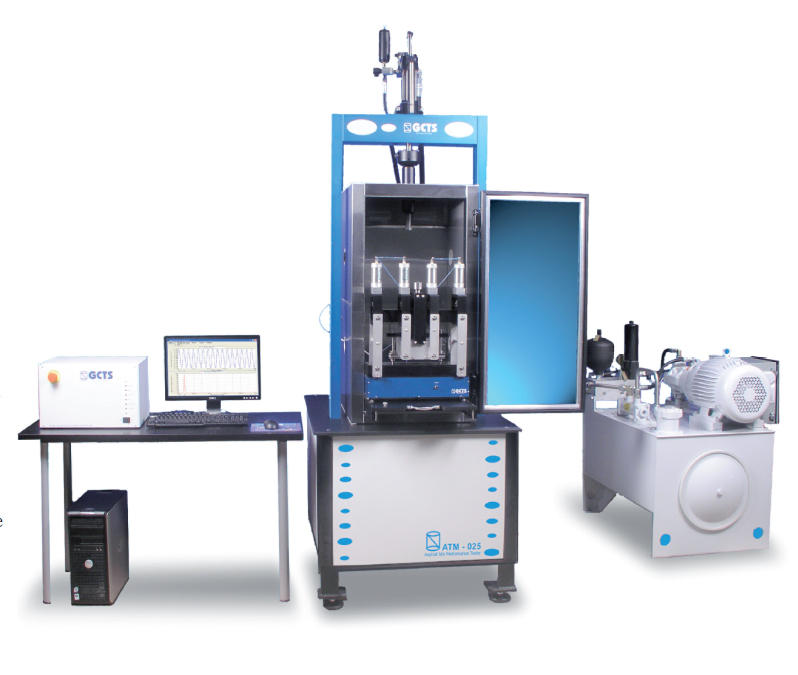
Tecnotest says the GCTS ATM-025 Asphalt Mix Performance Tester is built on a modular system
The stresses placed on modern asphalt and bitumen means that specialist equipment is essential to make sure performance specifications are met
As road traffic increases at a rapid pace and road safety becomes a priority issue, asphalt is put under increasingly higher stresses. For example, road surfaces are subject to compression, flexural tensions and tangential stresses: internal friction, depending on the aggregates, and the cohesion, guaranteed by bitumen's composition, are the two main properties which allow asphalt to face such heavy traffic. At the same time, temperatures (low and high) along with water and humidity can affect asphalt properties and performances.This means that modern asphalt, already harder wearing, longer lasting and with many more properties than their predecessors, is called on to produce even high performances in line with the specifications demanded by each individual road project.
During and after road construction, it is essential that those responsible for the work have the necessary equipment to carry out essential checks on bitumen and asphalt, and there are many, including softening point (range of temperatures at which asphalt softens); viscosity (an indication of how thick or thin the liquid asphalt is at various temperatures); penetration (how far a weighted needle or cone will sink into the asphalt during a set period of time); consistency and bitumen content. Marshall Stability tests are used to determine the performance of asphalt under loads, while the Hveem stabilometer is used to obtain materials characteristics for designing pavements.
According to Italian testing equipment manufacturer Controls, since Superpave's inception more than a decade ago, asphalt mix designers in North America have searched for a simple mechanical "proof" test analogous to Marshall stability and flow tests and Hveem stabilometer method, so as not to rely solely on performance-grade (PG) binder specifications and volumetric design method. [Superpave is an overarching term for the results of the asphalt research portion of the 1987-1993 Strategic Highway Research Program (SHRP), and it consists of three basic components: an asphalt binder specification, a hot mix asphalt (HMA) design method and HMA tests and performance prediction models. Each one of these components is referred to by the term Superpave/SUperior PERforming Asphalt PAVEments].
The Simple Performance Tester (SPT) is the culmination of that search, based on the success of two National Cooperative Highway Research Program (NCHRP) projects, says Controls.
"SPT is an innovative, integrated hydraulic testing machine incorporating a high performance hydraulic actuator, air-cooled hydraulic power pack, Control and Data Acquisition System (IMACS), a combined triaxial cell and environmental chamber, with its own temperature control unit, in one compact machine.
"The SPT was specifically designed to perform the three candidate tests developed under NCHRP projects 9-19 and 9-29. Numerous sensors and safety interlocks are incorporated in the design for operator safety and the triaxial cell is self-opening and closing for ease and speed of operation," says Controls.
The machine, manufactured by IPC Global and distributed by Controls Group, comprises an electrically powered hydraulic loading system, a confining pressure system, an environmental chamber, and appropriate control systems. A highly modified geotechnical triaxial cell doubles as the environmental chamber. Air is used as the confining medium since the pressurisation requirements are fairly modest (up to 210 kPa) and air is a clean approach for the technician.
The test control system is computer based, using sensors on the machine for feedback (load and confining pressure) signals. Additional sensors are used for pseudo-feedback activities such as stopping or altering the conduct of the test based on a given criterion or conditional limit. The hydraulic system uses a bottom loading actuator system with an electro-hydraulic servo-valve.
The confining pressure system and the environmental chamber is a triaxial cell configured for internal instrumentation. Heat content of the confining medium is changed by a unit outside the triaxial cell controlled by feedback from a temperature sensor inside
the cell.
"The triaxial cell is raised and lowered by the control system so that the operator is not required to manually dismantle and move the cell by hand when changing specimens.
"The PC software is user friendly and menu driven: in operation, the system gathers the dynamic data from the transducers attached to the specimen under test then displays plots appropriate to each test type and function mode, in real-time on the PC," says Controls.
The software automatically saves test information in binary files, which then provides the off-line facilities of reviewing previously run tests through the graphics screens of the system or generation of data files for importing into a spreadsheet package.
Gyratory compactors
Automatically measuring the specimen height during consolidation, the 4140-B produces a densification graph that the designer can use to produce the "best possible paving mixture."
Troxler says that its Model 4141, a new generation of Superpave Gyratory Compactor, is designed to accommodate field labs and construction trailers.
The most efficient means for project control of all Superpave mixtures, the Model 4141 produces consistent specimens time after time. Featured is a proven method of compaction, using a fixed angle, constant consolidation pressure and a set rate of gyration.
Output of specimen height is automatically directed to a printer or computer during the consolidation cycle or stored and downloaded after compaction is complete. Troxler GyroPave for Windows software allows tabulation or graphing of data and the use of the popular Excel spreadsheet program for data analysis.
The company has also introduced an online training facility for HAZMAT certification for portable nuclear gauge users, the first in a comprehensive suite of training classes that will be offered by the company. In addition, Troxler will offer both Radiation Safety Officer Certification and Nuclear Gauge Safety online later this year.
Troxler's online training meets Nuclear Regulatory Commission and
Rapid expansion
Meanwhile,The company, based in Ripley, Derbyshire, Central England, designs and manufactures equipment used worldwide by universities, contractors, oil companies and departments of transport amongst others. While at the University of Nottingham (NTEC) in the 1980s, the founder of the business, Keith Cooper designed the revolutionary, user-friendly method of measuring and assessing the mechanical properties of asphaltic materials through the equipment known as the Nottingham Asphalt Tester (NAT). This has since been superceded by the UTM-NU. Keith is now Chairman, and his son Andrew now runs the business along with Managing Director, Peter Grafton.
The company attained UKAS (UK Accreditation Service) and ISO, adding to its credibility in the market. In 2006 the company employed seven people, and this has more than tripled in just over three years, with the company moving into new purpose-built premises last year backed by a government grant for business investment (GBI), which helped to facilitate a dedicated area for technical support and R&D.
With more than 70% of the company's business attributable to export markets, R&D of new products and associated software all maintained in-house has been and continues to be essential to its product portfolio and continued success.
For example, the company offers the large four-point bending beam CRT-LH4PT-BB for testing resistance to fatigue and modulus of asphaltic mixtures, by applying state-of-the-art servo-hydraulic technology, high-speed digital data acquisition and control system, together with user-friendly software. During testing both graphical and tabular data are displayed on screen and test data is stored to disc in
The test frame is housed in a temperature controlled cabinet with fan-assisted air circulation and a temperature range of -20°C to 30°C. The constant torque clamping and three-transducer deflection measurement system of the CRT-LH4PT-BB can be configured to accept different beam sizes from 50mm up to 100mm width. This means that the ratio between beam dimensions and maximum aggregate size of test specimens will fully satisfy the requirements of stringent European specifications for fatigue and modulus testing.
Gyratory compaction is recognised as one of the best laboratory methods for the assessment of compactibility and the manufacture of test specimens. Compaction is achieved by the application of a vertical stress (normally 600kPa) via end platens to a known mass of asphaltic mixture within a 100 or 150mm internal diameter mould. Unlike most compactors, moulds can be tested on the Cooper gyratory compactor without changing machine parts. A filled gyratory compactor mould is heavy and often very hot. In many cases these moulds have to be lifted in and out of gyratory compactors, however with the CRT-GYR-EN no lifting of filled moulds is required. They are automatically lowered into position for compaction and then lifted up again for transfer to the integrated demoulding system. The CRT-GYR-EN gyratory compactor allows for ease of use and has been designed with the user in mind.
Cooper Technology will celebrate its 20th anniversary of trading in May 2010.
Tecnotest at Asphaltica
Indeed, at the recent
He highlighted the importance of roadways, pointing out some of the problems (fatigue cracking, thermal cracking, rutting) and the very high costs of repairs saying that pavement roughness increases vehicle component failures and that trucks uses 4.5% less fuel on smooth roads rather than rough.
Tecnotest says: "Asphaltica has become an increasingly important venue for Tecnotest. The testing of asphalt mix materials used in road construction plays a significant role in our company's development and is a sector to which we are particularly committed."
It exhibited equipment offered on the market to enable the process of road construction material categorisation and testing to be followed, from sample preparation to laboratory and in situ testing.
The company says that its combined efforts (with GCTS) have led to the GCTS ATM-025 Asphalt Mix Performance Tester, "representing a complete solution for asphalt testing."
The machine, built on a modular system, can be configured for testing asphalt mixes according to methods and procedures prescribed in US ASTM and AASHTO Standards, as well as in the European EN 12697. Accessories available to the end user include devices for loading, for measurement, control systems for performing indirect tensile tests, cyclic compression and resistance to fatigue.
The system has been designed for performing advanced tests while simplifying the user's task by providing all the design elements with automatic user guide and management. The technological core is in the digital signal control and conditioning microprocessor and the completely dedicated software developed entirely by GCTS.

